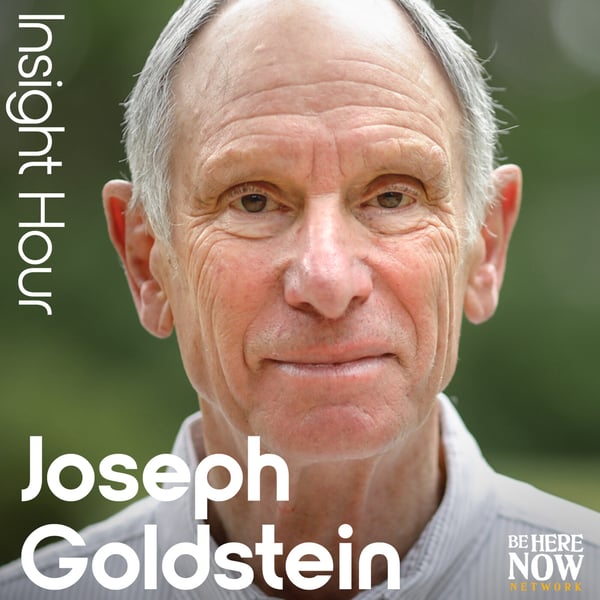Ep. 187 - Love & Fear
Insight Hour with Joseph Goldstein
Be Here Now Network
4.8 • 864 Ratings
🗓️ 8 November 2023
⏱️ 65 minutes
🧾️ Download transcript
Summary
Joseph Goldstein delves into the concepts of loving-kindness, compassion, and the fear of discomfort. He highlights the transformative power of loving-kindness, mindfulness, and compassion in overcoming fears and limitations, ultimately fostering genuine happiness.
This dharma talk, recorded on February 18, 1997, was originally published on Dharma Seed.
This podcast is sponsored by BetterHelp. Click to receive 10% off your first month with your own licensed professional therapist: betterhelp.com/insighthour
In this lecture, Joseph:
- Affirms that at the depths of our hearts and minds there is a basic reservoir of goodwill
- Defines mettā, or loving-kindness, as the basic generosity of the heart
- Takes note of the “upward spiral” of happiness that mindfulness and loving-kindness promotes
- Reminds us to stay open to suffering and
- Ruminates upon the empty nature of fear itself
“If you keep shining your compassion and understanding on it, your fear will soon crack and you will be able to look into its depths and see its roots.” – Joseph Goldstein
See Privacy Policy at https://art19.com/privacy and California Privacy Notice at https://art19.com/privacy#do-not-sell-my-info.
Transcript
Click on a timestamp to play from that location
| 0:00.0 | If you keep shining your compassion and understanding on it, your fear will soon crack and you will be able to look into its steps and see its roots. Welcome to the Joseph Goldstein Inside Hour. |
| 0:30.0 | This podcast is an expression of our shared interest in self-discovery. |
| 0:35.0 | Join Joseph as he shares his deep knowledge of the path of mindfulness. |
| 0:41.0 | If you are interested in supporting this podcast, please go to be here now network |
| 0:47.0 | dot com slash Joseph. First step in both the Bopassina practice and the Netta practice is collecting the attention, |
| 1:08.0 | gathering the attention. We gather in the scattered mind and shepherd it back either to the breath or to the body or to hearing. |
| 1:24.0 | Or when we're doing the meta practice, |
| 1:26.0 | shepherding the mind back to the phrases or the image of the person we're sending it to. |
| 1:40.0 | And in this process of collecting the attention, concentrating the mind, |
| 1:42.0 | from time to time we get overcome by different of the hindrances, sometimes singly, sometimes |
| 1:50.0 | sometimes multiply. sometimes we get overwhelmed by afflictive emotions, |
| 1:59.4 | those emotions which are really painful to be with. |
| 2:08.0 | But slowly as we keep coming back, as we make that effort to come back to a main focus of attention, |
| 2:21.0 | gradually and over time the mind begins to settle down, begins to get a little bit quieter, begin to create to some degree an inner spaciousness, in a relaxation. |
| 2:29.4 | Slowly the mind becomes somewhat less reactive, less judgmental. |
| 2:40.6 | We're not so completely lost in the discursive mind and the proliferation of thoughts in our particular stories. |
| 2:50.0 | As we |
| 2:55.0 | abide more and more in the simplicity of the present moment, |
| 3:00.0 | this as we settle back into that very soft, open, exact, relaxed awareness. |
| 3:10.0 | What happens is that our minds begin to relax, our hearts begin to relax, begin to |
| 3:17.2 | open. We begin to see ourselves with much greater clarity and see parts of ourselves that we had not seen before. |
| 3:28.5 | We're not seen before so clearly. It's a poem by a 10th or 11th century Japanese woman poet Izumi. |
... |
Please login to see the full transcript.
Disclaimer: The podcast and artwork embedded on this page are from Be Here Now Network, and are the property of its owner and not affiliated with or endorsed by Tapesearch.
Generated transcripts are the property of Be Here Now Network and are distributed freely under the Fair Use doctrine. Transcripts generated by Tapesearch are not guaranteed to be accurate.
Copyright © Tapesearch 2025.

